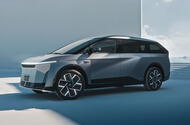Foxtron Model D is designed to prioritise aerodynamic performance
Automotive division of Taiwanese tech giant Foxconn unveils radical seven-seater with on-board iPhones and iPads
Taiwanese tech giant Foxconn’s automotive division has revealed a radical electric MPV designed by Pininfarina.
Majoring on connectivity and aerodynamics, it’s called the Foxtron Model D after its positioning in the D-segment, measuring 5.13m long and 1.99m wide.
Foxconn claims that it will achieve a range of more than 410 miles on the WLTP test cycle and that it will do so using a 100-120kWh lithium-iron-phosphate (LFP) battery.
That would make it the longest-range electric seven-seater on sale, pipping the Peugeot e-5008, which gets exactly 410 miles from its 98kWh battery.
Key to this range is aerodynamic efficiency, claims Foxtron: there’s a variety of holes and creases in the bodywork in order to smooth the flow of air through and around it.
A gap in the front grille flows through to the scuttle, for example. This shrinks the frontal area and helps to channel air over the roof, contributing to a drag coefficient of just 0.23Cd.
The Model D’s electrical architecture also plays a key role, having been designed around one centralised computer with several ‘zonal’ modules for parts such as the infotainment system.
This design helps to improve energy efficiency and – given it’s to be used in all the company’s cars – reduces costs, Foxtron said.
The car’s platform has been developed by ZF Chassis Modules, which Foxconn acquired a 50% share of earlier this year.
Inside, the Model D is designed to make the most of other products manufactured by Foxconn: the armchairs in the six-seat version have charging pads that fit an iPhone and each front seatback has a slot for an iPad.
Mass production is set to begin in two years’ time – although it won’t be badged as a Foxtron. The firm’s business model is to license cars to other firms, even letting them redesign them slightly to suit their needs.
Foxtron’s Model C is currently sold by Taiwanese brand Luxgen, for instance, and future models will be sold by Saudi Arabian EV start-up Ceer.







